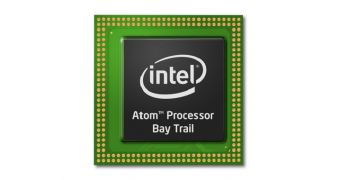You are probably already familiar with Intel’s Bay Trail and Haswell platforms that power a lot of budget notebooks and tablets. But the company is promising to take things at the next level with its new Braswell processors.
These next-gen chips are expected to consume even less power and bring about improvement performance, too. With the new platform, Intel is targeting notebook and tablets selling below $500 / €363.
Braswell will be offered as a low-cost, low-power alternative to the 5th-gen Core processor code-named Broadwell (via CNET).
Braswell SoCs are based on a 14-nanometer design and that supposedly means the chips will prove to be more efficient than 22nm Haswell and Bay Trail chips. Intel expects Braswell chips to be implemented in future Chromebook offerings.
One of the latest Chromebook offerings launched on the market is the Toshiba one, which runs on the already low-cost Intel Celeron processor. Braswell chips will probably find their way in the company’s next-gen Chrome laptops.
Intel announced the new chips at the Intel Developer Forum in China and also launched new 64-bit Bay Trail Chips for both Android and Windows tablets with prices that should start at just $99 / €72.
Furthermore, Intel demoed an Android KitKat 4.4 with a 64-bit kernel compatible with Intel Architecture devices. This might give Intel a competitive edge and advantage over other chip makers, although most Braswell products will probably ship with a version of Windows. Although dual-OS remains a big possibility in China.
“With this release, the company ported, validated and tested the Android Open Source code on IA taking on the work that developers typically would need to do on their own.”
“This release will provide the ecosystem with 64-bit kernel support for development of next-generation devices.”
Anyway, returning to Braswell for a little bit, Intel declined to give any indication of when the chips will actually arrive in the wild.
Previously, Intel talked about working on a 14-nanometer chip called Cherry Trail, which was supposed also to be a follow-up of the 22-nm Bay Trail chips. Unlike Braswell processors, that will go into Chromebooks, Cherry Trail will be implemented into tablets.
As we previously reported, Intel seems to have big plans for the current year. The company is expecting to raise its 10 million tablet-shipments to a significant 60 million units. The chip maker is also aggressively targeting the educational market, which has experienced a visible increase, as of late.

 14 DAY TRIAL //
14 DAY TRIAL //